
One of Hollywood’s most versatile stars, Hugh Jackman burst onto the international stage through his role as Wolverine in the X-MEN series. Always in demand, Jackman has most recently starred in the acclaimed big-screen adaptation of the musical LES MISERABLES, and alongside Jake Gyllenhaal in Denis Villeneuve’s PRISONERS.
The Australian-born Jackman was already an established Broadway and West End star when he landed the role of Wolverine. He played Curly in the National Theatre’s acclaimed production of OKLAHOMA! and earned an Olivier nomination for Best Actor. His headline show, HUGH JACKMAN: BACK ON BROADWAY, played throughout the winter of 2011 to sell-out crowds.
In EDDIE THE EAGLE, Dexter Fletcher’s film about the legend behind one of ski jumping’s most beloved figures, Jackman plays Bronson Peary, a fictionalised American coach who is reluctant at first to train the unpolished ski jumper Eddie, played by Taron Egerton.
From the film’s set at London’s Pinewood Studios, Jackman explains his attraction to the role and how it felt to watch Eddie’s story play out at the 1988 Winter Olympics.
What was your first reaction to the idea of a movie about Eddie “The Eagle” Edwards?
Well, I knew all about Eddie. Matthew [Vaughn], who I know already through X-MEN: FIRST CLASS, he got me the script and I instantly pricked up my ears. Eddie the Eagle is kind of a legend in Australia. He embodies everything Australian – the whole have-a-go attitude. Australians, in a way, would prefer someone who has a go and doesn’t win than someone who’s safe and boring and wins. We don’t really like that kind of person. So I just always loved that, and when I read the script I found it really heart-warming. It reminded me a bit of BILLY ELLIOT and a bit of COOL RUNNINGS, a movie that I love. I was really interested from the beginning. It was uplifting as well as funny, and I’m a big sports nut, so the sports angle really intrigued me.
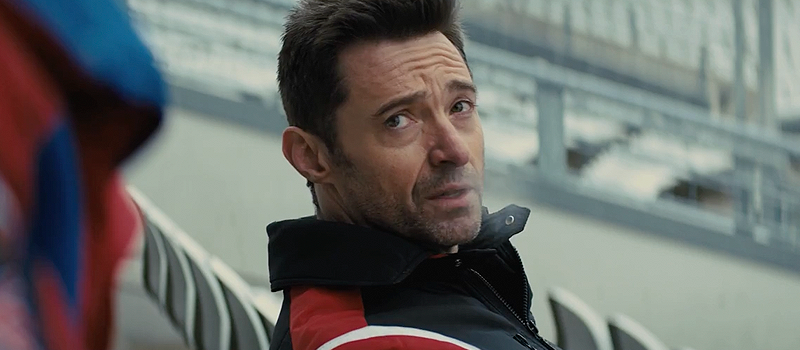
So would Eddie’s story have made the news in Australia in 1988?
It was a huge story. To be honest, the Winter Olympics aren’t as big in Australia. I think we have one gold medallist, and it’s one of the best gold medal victories in Olympic history. Steven Bradbury was his name, and he won the speed skating gold medal because there are five people in the race and he was a lap behind when the four people in front of him crashed on the last lap. They all crashed on the last turn but he was so far behind that he wasn’t part of the crash, and he went from last to winning the gold medal. That’s our only gold medal in the Winter Olympic history. Watch it on YouTube, it’s one of the greatest moments ever. So we’re not as good, but somehow the Eddie the Eagle story captured the whole country and we loved it. Aussies love a laugh, and they love the fact of someone who’s prepared to have a go. I remember all about Eddie’s adventure at the time and I remember being mesmerised by it.
Do you think people like Eddie remind us that the Olympics were founded on the idea of amateur competition?
Totally; it’s sport at such a high level of results and achievements – so finely tuned. This kid who took his first jump two years before and decided he wanted to go to the Olympics, got through on a loophole and he did it, and it was fantastic. I can’t remember one person from that Olympics, but I remember Eddie the Eagle, and that’s true of a lot of people around the world. That’s something for him to be proud of.
What’s interesting about this script too is that it really captures that turning point where sport was becoming more professional. The Olympics had become more about, “We need to attract more sponsors; we need pin-ups for the marketing people, we don’t need Eddie the Eagle.” But Eddie was the one who was on Johnny Carson at the time, when Johnny Carson was at the height of his fame. He was brilliant on the show and had everyone laughing and had Johnny Carson in tears. He became so famous through that.
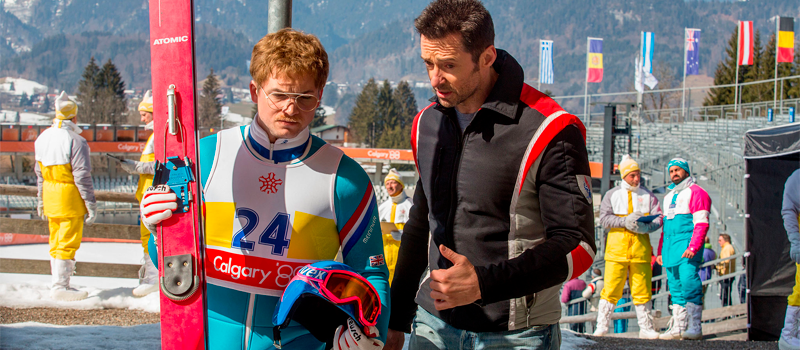
How do you think Taron has been capturing Eddie’s spirit of personality?
I am just so impressed and proud and really blown away by what Taron is doing. It’s a really difficult thing to play somebody, and he’s not going for a straight-out imitation. It’s certainly got the essence of Eddie in every way. It’s got the optimism and it’s got the humour. The positivity and the never-say-die attitude are right in there, and underneath what he’s really captured is the vulnerability.
Obviously a lot of his antics came out of nervousness and feeling uncomfortable. He was an outsider, Eddie. He was an outsider in the Olympic movement, and growing up he was an outsider. I find what Taron is doing is very funny and completely charming, but it’s also very touching. It’s very winning and you find yourself willing him to win, even though you know the story. It’s a difficult thing to pull off. Not only is he doing a brilliant job but he’s having the best time doing it. It’s really exciting for both of us, really.
Christopher Walken is on set today for a little cameo. How has that been?
Being on set with Christopher Walken… I’ve never seen so many people turn up to rehearsal! He’s iconic – everything about him is iconic. That word is thrown around quite loosely these days, but he’s truly like no one else. I think that’s an essential part of the work. His delivery, that famous voice, his presence. I was there with Dexter at the monitor (during filming) and we were pinching ourselves with how lucky we were to be there. On just one take, he’s absolutely perfect. He’s got this presence that’s perfect for Warren Sharpe, who’s this incredible patriarch – like a god of the sport – and he’s got that sense about him. Everyone’s in awe of him. There’s no acting required at all when you’re in a scene with him. The main problem is keeping my jaw from hitting the floor! [laughs]
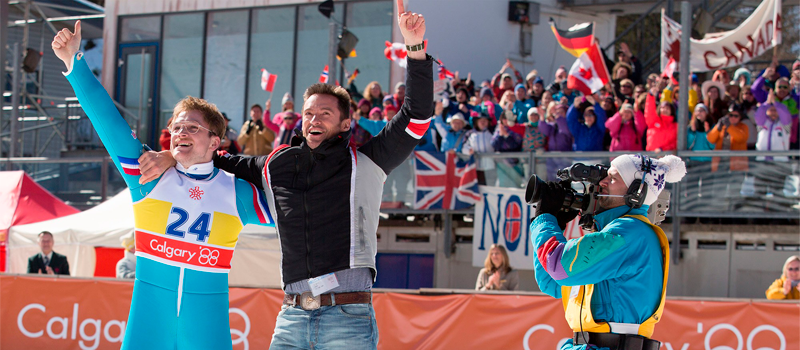
Bronson’s a polar opposite to Eddie. He’s jaded and won’t work, but he has immense talent for the sport. Do you think it’s a case of opposites attracting?
It’s a good point that in many ways they are opposites. It’s kind of a redemptive tale, particularly for Bronson Peary, but for Eddie too. It’s about owning yourself and who you are. Bronson Peary had bundles of talent, and was something of a prodigy when he began, and was expected to do big things. But he had none of the discipline and none of the humility. He was elitist, he was rebellious and he hated being told what to do. The thing that made him brilliant was also his downfall, in the end.
You catch up with a man in this story, twenty years on from being kicked out and regretting every second of it. He’s living a life of a lot of pain from that and a huge amount of regret. He’s drinking and living a life still in the slopes. He’s still hanging out, because that’s what he knows and loves. It’s that kind of person who’s like, “Alright, no one can destroy me but me.”
He’s going to live life his own way, and that’s what he has in common with Eddie. With Eddie, he sees the outsider in him. He sees that will to say, “I don’t care what you think of me, I’m just going to keep forging ahead with or without you.” He relates to him but he can see him making some of the mistakes he made. They’re both rash and impulsive and prone to making bad choices. He doesn’t want him to do that.
I’ve really enjoyed working with Taron and working on this relationship because it becomes a true friendship. Bronson Peary doesn’t want a friend, and he doesn’t want to coach him. He doesn’t want this kid in his life. It’s this kid’s persistence that gets in there, and he begrudgingly and reluctantly really turns his life around because of this friendship.
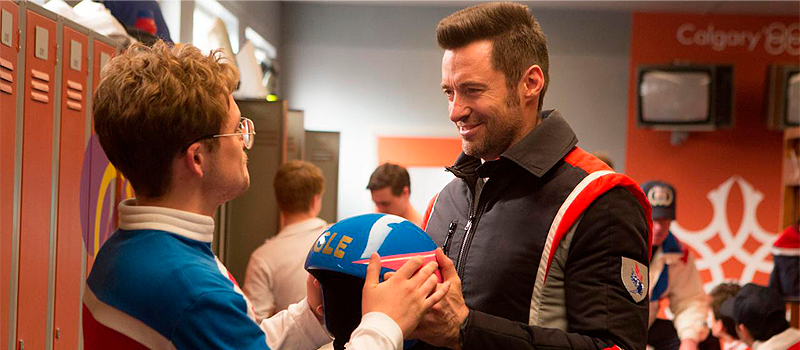
Were you tempted to try one of the jumps yourself when you were out at the real venue?
I was itching to do it, but it was tough to get away with it! [laughs] No, I didn’t do the jumps, but actually I had to do a little skiing because my character does jump. We just wanted to get the stop of him coming in.
I went up the thing, and looking at it I thought, “Oh I’ll go halfway up the hill.” I was about an eighth up the hill and already I was thinking, “OK, that’s pretty high…” I eventually got higher and higher, but that was just the outrun. That wasn’t even the jump. So no, I didn’t give it a go. I was a good boy.
Maybe one day?
Ski-jumping? We did honestly talk about it. I think I would do the 15m. I’d give that a go. That’s about the height of this soundstage, so it’d still be kind of nerve-wracking. It’s one thing to fall down the ski slope, because it’s snow, but this is ice. It’s like cement. The idea of doing the 70m or the 90m is impossible to think of, even if you’ve done the 40m for ages. These kids start when they’re 6 or 7 and they’re fearless.
BONUS:
Virkelighedens Michael Edwards
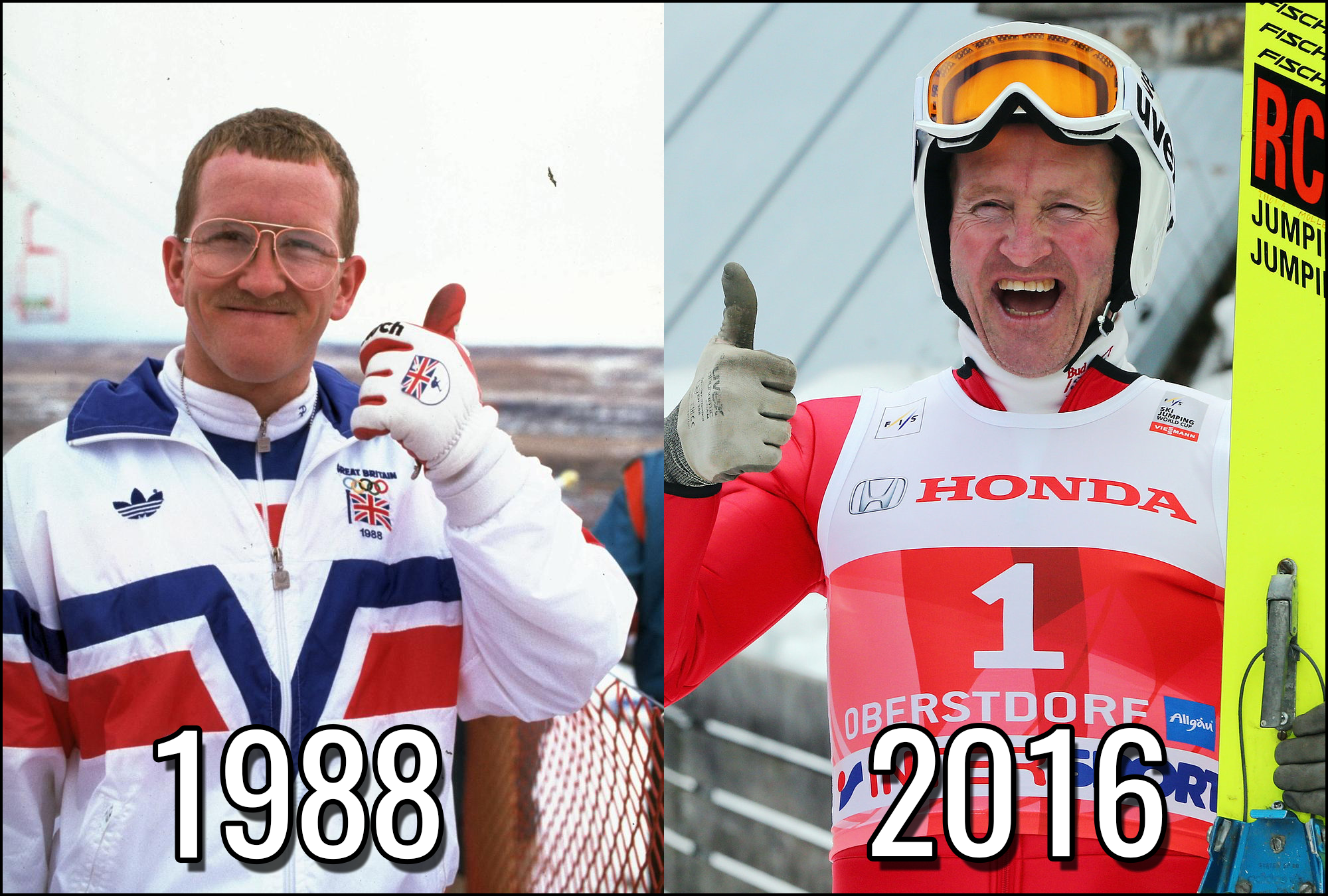
Michael Edwards, bedre kendt som Eddie “The Eagle” Edwards, (født 5. december 1963 i Cheltenham, England) er en britisk skihopper. Han var den første til at repræsentere Storbritannien i olympisk skihop, hvilket fandt sted ved Vinter-OL 1988 i Calgary. Ved den lejlighed satte Edwards engelsk rekord på 73,5 meter.
Edwards blev kendt i offentligheden på grund af sin specielle stil og ikke særligt imponerende resultater. IOC og de øvrige bakkehoppere var dog ikke begejstrede, da de mente at han var med til at latterliggøre sportsgrenen. Dette medførte en regelændring, som blev døbt “Eddie the Eagle-reglen”. Den indebar at olympiske deltagere fremover skal have deltaget i internationale konkurrencer og i disse ende blandt de 30 procent bedst placerede eller være blandt de 50 bedst rangerede i verden. Dette umuliggjorde i praksis, at andre kunne gentage hvad Edwards havde gjort og det betød at Edwards dermed ikke kvalificerede sig til de følgende olympiske vinterlege i Albertville og Lillehammer.

